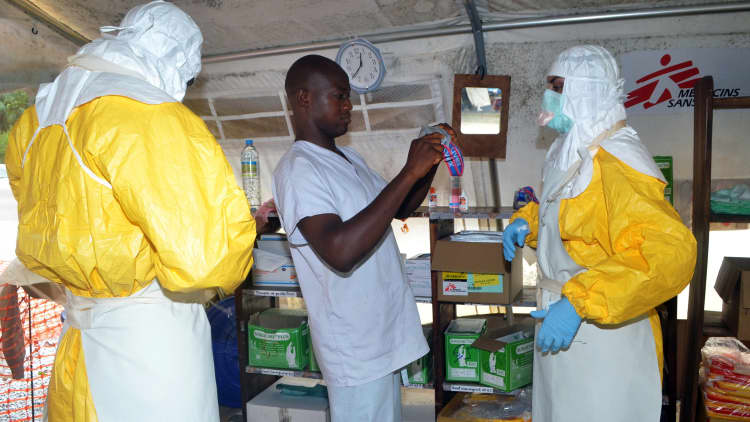The Ebola virus outbreak in West Africa is five months old and has killed nearly 900 people.
But in the last few days, Americans have found it closer to home with the arrival of two U.S. Ebola patients to Atlanta as well as headlines announcing the testing of ill patients that recently traveled from West Africa.
Despite the overall concerns, what's happened so far shows that the country's medical system is working to keep the Ebola virus from catching fire in the U.S., said internist Pascal Jame Imperato.
Read MoreEbola virus: 'Horrible way to die' and no vaccine
"We have the medical infrastructure in place to take care of the problem," said Imperato, who is dean of the school of Public Health at SUNY Downstate Medical Center.
And because Ebola symptoms are somewhat common in other diseases as well, conditions can confuse medical workers on whether someone has Ebola or not, Imperato said.
"It's a deadly disease for sure, but I'm not concerned about it spreading in the U.S.," he added.
Recent fears started when two American aid workers were diagnosed with Ebola in Liberia. They are currently undergoing treatment at Emory University Hospital in Atlanta, Georgia.
In New York City, a man was tested at Mount Sinai Hospital after arriving in its emergency room Monday with a high fever and gastrointestinal complaints. But, so far the city's health department has said the man is "unlikely to have Ebola."
And in Ohio, a 46-year-old Columbus resident tested negative for the virus.
Just this weekend, the Centers for Disease Control said the Ebola virus is out of control and has advised against non-essential travel to West Africa.
And British Airways suspended flights Tuesday to and from Liberia and Sierra Leone until August 31, as the two West African nations battle with the world's largest and deadliest Ebola outbreak.
Read More
Liberia is believed to be where the first cases of this latest outbreak started. An estimated 1,600 people in the three countries have the disease leaving more than 887 dead.
But that death toll is expected to rise in the weeks ahead.
Meanwhile, the World Health Organization last week said it planned to launch a $100 million campaign with the aid of member West African countries to help stop the Ebola spread.
'Watch Nigeria'

Previous Ebola outbreaks in Africa, though deadly, have burned themselves out. But experts aren't sure about this one.
"Whether this outbreak will spread even more is hard to say," said Alessandro Vespignani, who is a professor of physics and computer science at Northeastern University.
Vespignani has created computer models to track the potential spread of deadly viruses like the lethal avian flu virus.
"But there's one country worth watching and that's Nigeria," Vespignani said.
He added that Nigeria has had a few cases of Ebola and because it's a more populous country than nearby by Sierra Leone or Liberia, the spread of the virus in Nigeria could mean it will spread to other places in Africa.
Fatal disease
Ebola is a severe and nearly always fatal disease to humans, according to WHO.
There are several strains with an incubation period of up to 21 days after infection.
Symptoms include fever, weakness, muscle pain, headache and sore throat. This is followed by vomiting, diarrhea, rash, impaired kidney and liver function and, in some cases, both internal and external bleeding.
Read More
What's helping the spread among Africans is that the outbreak has reached more populated areas than during past outbreaks.
Also, burial practices, which include washing the bodies of victims, is spreading the virus. The situation is exacerbated as relatives hide virus carriers from proper medical aid and instead pursue home remedies.
"There has to be better infection control and more education for people in Africa about the dangers of exposure to victims," said Scott Lillibridge, of Texas A&M University's Health Science Center School of Public Health.
More outbreaks ahead
Ebola was introduced in the U.S. when it was found in quarantined monkeys imported from the Philippines in 1989, 1990 and 1996.
But no human infections were discovered.
What the media attention is doing now, said Gerald Parker, is reminding everyone that infectious disease outbreaks happen more often in today's highly connected world.
"It's easy to get complacent in between the outbreaks," said Parker, who is vice president for public health and response at Texas A&M's health center.
"But we are seeing more of these over time and it's good to keep the public aware of them," he said.
—By CNBC's Mark Koba


